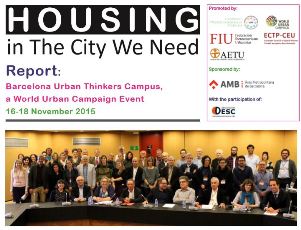Housing in The City We Need, Barcelona Urban Thinkers Campus

In one of the official gatherings intended to inform Habitat III, an “Urban Thinkers Campus” (UTC) in Barcelona (November 2015), focused on the core commitment of the Habitat Agenda: ensuring the progressive realization of the human right to adequate housing. In that convivial meeting, participants insisted that the human right remain a core part of the Habitat Agenda when renewed in 2016. The participants recognized the human right to adequate housing as part of the human right to an adequate standard of living, as provided in the numerous international legal instruments, including binding treaties and customary law.
This edition of the serial UTCs was sponsored by the Area Metropolitana de Barcelona (AMB) and co-organized by Habitat Professionals Forum (HPF), International Federation of Urbanists (Federación Internacional de Urbanistas, FIU), European Council of Spatial Planners – Conseil Européen des Urbanistes, (ECTP-CEU), all WUC partners, the Spanish Urbanists Association (Asociación Española de Técnicos Urbanistas, AETU) and Observatori DESC.
Focused on the theme “Housing in The City We Need,” this UTC gathered housing experts, local authorities, social leaders, urban agriculturalists, legal specialists, academics and students, peasants and trade unionists, human rights defenders, dwellers and neighborhood’s organizations, spatial planners, women, mean, youth journalist and writers to debate related themes. This diverse group shared an interest in promoting adequate housing in socially and economically inclusive human settlements, both in cities and in rural development.
The 93 participants from 14 countries followed the UTC methodology, which pursues a consensus-building approach. Consistent with preceding Habitat Agenda commitments, they urged that, within this normative framework, housing remain an essential element and priority of the New Habitat Agenda. Consistent with the “habitat” approach and the new 2030 Sustainable Development Agenda, that calls for “a cross-sectoral and integrated regional approach to planning, production and governance of human settlements for all, without discrimination, leaving no one behind and prioritizing enhancing democracy and human rights.”
Assuming that approach, within its diverse contexts, the UTC called for continuity of the related promises in the Habitat Agendas of 1976 and 1996. They reported that “a review, evaluation, renewal and further development of those commitments are indispensable steps in the Habitat III process, whereby current and emerging economic, social, peace-and-security and environmental conditions pose new and pressing challenges.”
The discussions on spatial planning prioritized land distribution, value sharing and the need to avoid pockets of poverty encouraged by the precariousness of social housing and current real estate investment patterns. Many cities “have built massive social housing blocks on the outskirts of cities, far from the centers, and that have generated more poverty,” observed Lorena Zárate, president of the Habitat International Coalition. In some Latin American cities, Lorena continued, these blocks “have become ‘ghost buildings’ because, ultimately, the residents have been unable to meet the debts of an apartment property.”
Like the Habitat Agenda concluded at Habitat II (1996), the UTC also pledged to renew a commitment to combat homelessness, an issue seen as central to broader efforts to combat high levels of inequality. “The European standard of quality of life has deteriorated due to the growth of social inequality,” commented Jordi San José, representing the Barcelona Metropolitan Institute for Land Development and Asset Management.
Ana Sugranyes, a specialist in international development cooperation and social housing policies called for a policy rethink. She pointed to “an immense need to avoid slums and ghettos, caused by wrong social policies.” Considering the deficit in actual policies that treat adequate housing as a fundamental right, she reminded that “we need to consider constituent human rights in the context of the recognition of the right to the city, including the human rights to land, energy, transport and urban planning, and the social function of property as a valid social claim toward establishing this emerging right.”
The UTC also set several goals for the New Habitat Agenda, underscoring the urgent need for states to intervene in land markets to mediate interests and mitigate speculation. Implementing human rights norms requires protecting the tenure of vulnerable groups and ensuring the affordability of adequate housing.
In a special working session at Barcelona, HIC-HLRN Coordinator Joseph Schechla (Egypt) and Sonia Kirby, urban and environmental planner a lecturer at Griffith University (Australia), animated the discussions and collected recommendations from participants on security of tenure, a key concept and element of the human right to adequate housing. The group considered the gamut of tenure options in actual practice and innovated a new graphic rendition of the concept as a “Möbius strip of tenure.”
The UTC recommendations end by contextualizing Habitat III as an important opportunity to fill in gaps in the new global development framework agreed to in September at the United Nations. “Habitat III has a key role [to play] in filling the 2030 Sustainable Development Agenda gaps in specifying habitat indicators, including the respect, protection and fulfillment of tenure security for adequate housing,” the recommendations state, “paying particular attention to priority contexts such as colonial and foreign occupation.”
Downloads:
Security of Tenure through the Habitat Agenda, 1976–2016
UTC “Key Issues and Recommendations”
The full UTC report
Related articles:
Habitat III must rethink the role of housing in sustainable urbanization
Home Is Where We Practice Citizenship
Security of Tenure through the Habitat Agenda, 1976–2016
Connecting housing with sustainable urbanization in the New Urban Agenda
Let’s not forget the legacy of inclusiveness from Habitat II
Human Rights and the New Habitat Agenda
Habitat II Baby, Habitat III Bathwater
Fractured Continuity: Habitat II to Habitat III
|